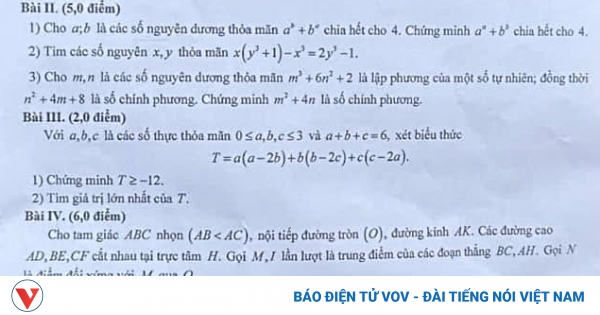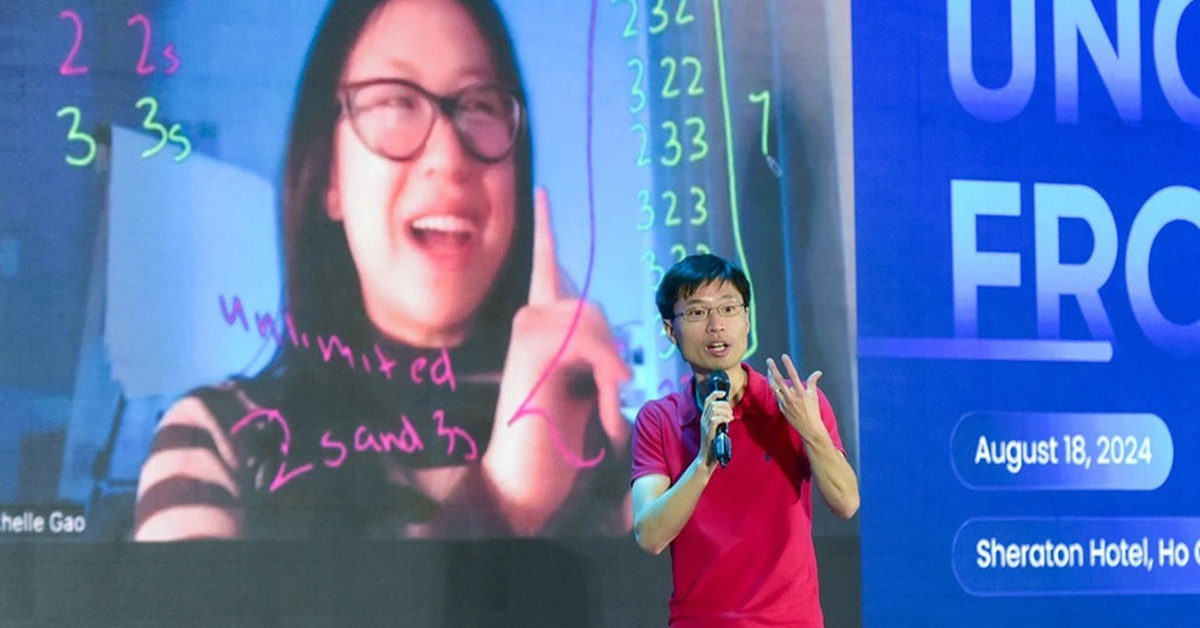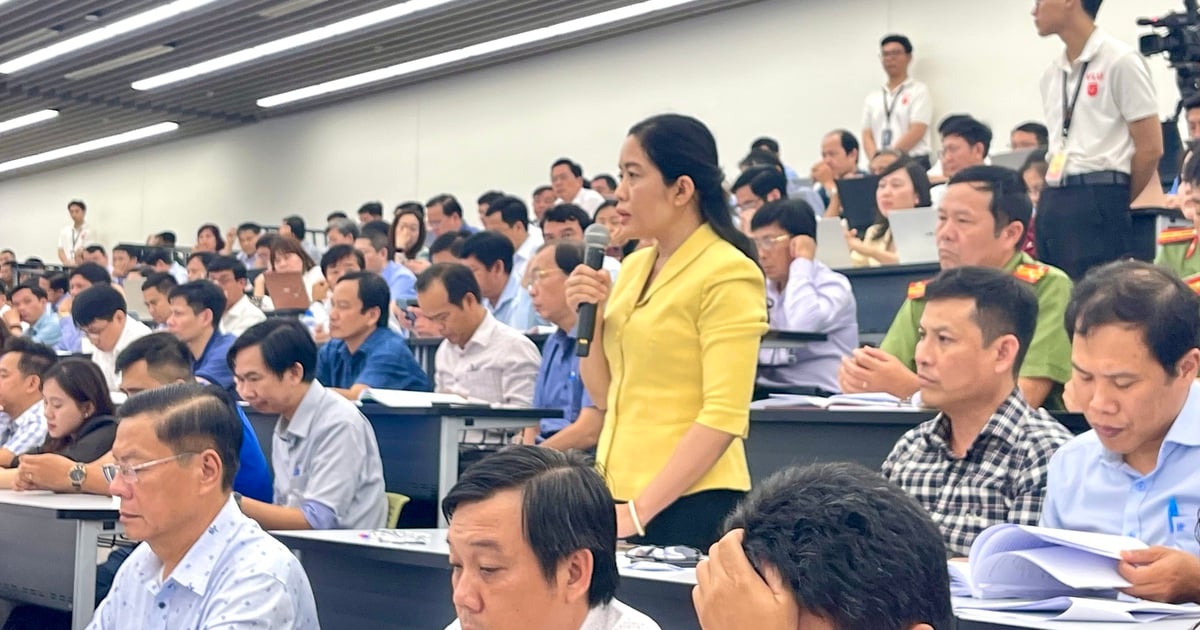
Joy and sadness, smiles and tears after the 10th grade math exam in Ho Chi Minh City
Why did many students cry after finishing the math exam in the recent 10th grade entrance exam in Ho Chi Minh City because they couldn't do the test?
Talking to Tuoi Tre Online , Dr. Phan Tat Hien - founder of Hoa Trang Nguyen Maths & Science, former head of the Department of Economic Mathematics at Saigon University - said that most students from high schools are learning math in the direction of learning and memorizing, so students can only do familiar forms, not knowing how to analyze.
Passive math alarm
Mr. Hien added: Many students learn math passively. They calculate passively, they cannot distinguish between a hypothesis and a conclusion when looking at a problem, and there is no connection between knowledge in math...
With this way of learning math, even though students can solve problems, they cannot think of new problems and sometimes cannot even understand the root cause.
Many readers believe that this is an alarming situation in math learning.
- Nowadays, students learn math like machines, they memorize but lack thinking. Especially in the textbooks for primary school students, there is a book called a workbook with solutions, students just need to fill in the numbers and calculations and then calculate.
Studying like that, grades 5 and 6 are equivalent to grades 2, because they only require the skills to perform four operations. The beauty of elementary math is finding the solution, which is now already done in the workbook, which is really dangerous.
Reader Tran Quoc Viet
- Students just "follow the path and walk". I also know a teacher who teaches students to write down the answer based on the "keywords" of the question. The same idea but without using the keywords, students immediately give up.
Vietroad Readers
- The problem is that studying is chasing exams. Of course, exams here are exams at school, which are the students' good records. At school, students are used to the 9s and 10s given by their teachers.
All the math problems in the midterm and semester exams were easy as pie because I memorized them from my teacher at school. But when I took the exam based on the questions from my department or office, I cried right away.
Reader Vinh Quang
- Before each test or semester exam, students are instructed by teachers about the type of test and then teachers only change the numbers during the test or exam. Therefore, just a little deviation in the test will ruin everything, the recent 10th grade entrance exam is the clearest proof.
I have a nephew who is the best student in grade 11, but the way he does his tests does not show any thinking of a good student. I took a simple trigonometry problem from 1995 when I was in school and gave it to him to try, but he said it was difficult and did not understand the problem.
Reader Tran Nam
Don't put all the blame on the students.
However, many readers believe that we cannot put all the blame for passive math learning on students.
- Saying that is unfair to the students, don't put all the responsibility on them. We should write "teaching and learning math like that, it would be strange if we didn't cry". Don't blame the learning, while the teaching happened before.
Readers of Garden Cleaning
- Why do students think about math when they go to extra classes, while when they study in the main curriculum, they are mostly passive? Is it because the teaching in schools does not provide enough guidance for students to think about math? Is there anything fishy here?
Nowadays, almost all students at all levels attend regular school all day, if they want better results, they have to take extra classes. Who created this situation for our children?
Reader Thien
- We must have a more objective view on this matter, and at the same time have arguments, methods or survey opinions from the affected subjects (9th graders), and should not make too subjective comments on the recent math exam phenomenon.
We need to have a more multi-dimensional view to contribute ideas to help improve the learning and practice of math at all levels.
Reader HT
- The math questions of Ho Chi Minh City meet the criteria for classifying candidates for the entrance exam, but it is not certain that they will be considered good.
The point that needs improvement is the way the questions are worded, which is confusing and long-winded, causing confusion for candidates. The writing style in the math questions must be concise and succinct, and not cause misunderstanding, otherwise this question will not be successful.
Reader Mai
- Students are taught in a stereotyped way, rote learning, so the questions are difficult, don't blame them for not thinking or being lazy.
How many students cried and were disappointed because of this test because the person who made the test wanted students to think, while most teachers now teach students to learn by rote and solve problems by rote. Whose fault is it?
Reader Hong
- I am a math teacher, my child just took the 10th grade entrance exam in Ho Chi Minh City this year, his academic performance is quite good. I also want my child to develop his thinking, but to be honest, there is a lot of homework at school.
I don't get enough sleep all year, so where do I find time to think deeply? In the last month of exam preparation, even though I've been given a break from other subjects, I only have to study math, literature, and English, but I still have to do a lot of the types of questions given by the teacher.
I think the current curriculum is overloaded for most students. In that situation, where is the time to ponder and research the beauty of mathematics?
Reader Minh Toan
Source: https://tuoitre.vn/hoc-toan-nhu-vay-khong-khoc-moi-la-sao-lai-do-het-loi-cho-hoc-sinh-20240612153726739.htm


![[Photo] General Secretary To Lam receives Japanese Ambassador to Vietnam Ito Naoki](https://vstatic.vietnam.vn/vietnam/resource/IMAGE/2025/4/3/3a5d233bc09d4928ac9bfed97674be98)


![[Photo] Moment of love: Myanmar people are moved to thank Vietnamese soldiers](https://vstatic.vietnam.vn/vietnam/resource/IMAGE/2025/4/3/9b2e07196eb14aa5aacb1bc9e067ae6f)

![[Photo] Special relics at the Vietnam Military History Museum associated with the heroic April 30th](https://vstatic.vietnam.vn/vietnam/resource/IMAGE/2025/4/3/a49d65b17b804e398de42bc2caba8368)























































































Comment (0)